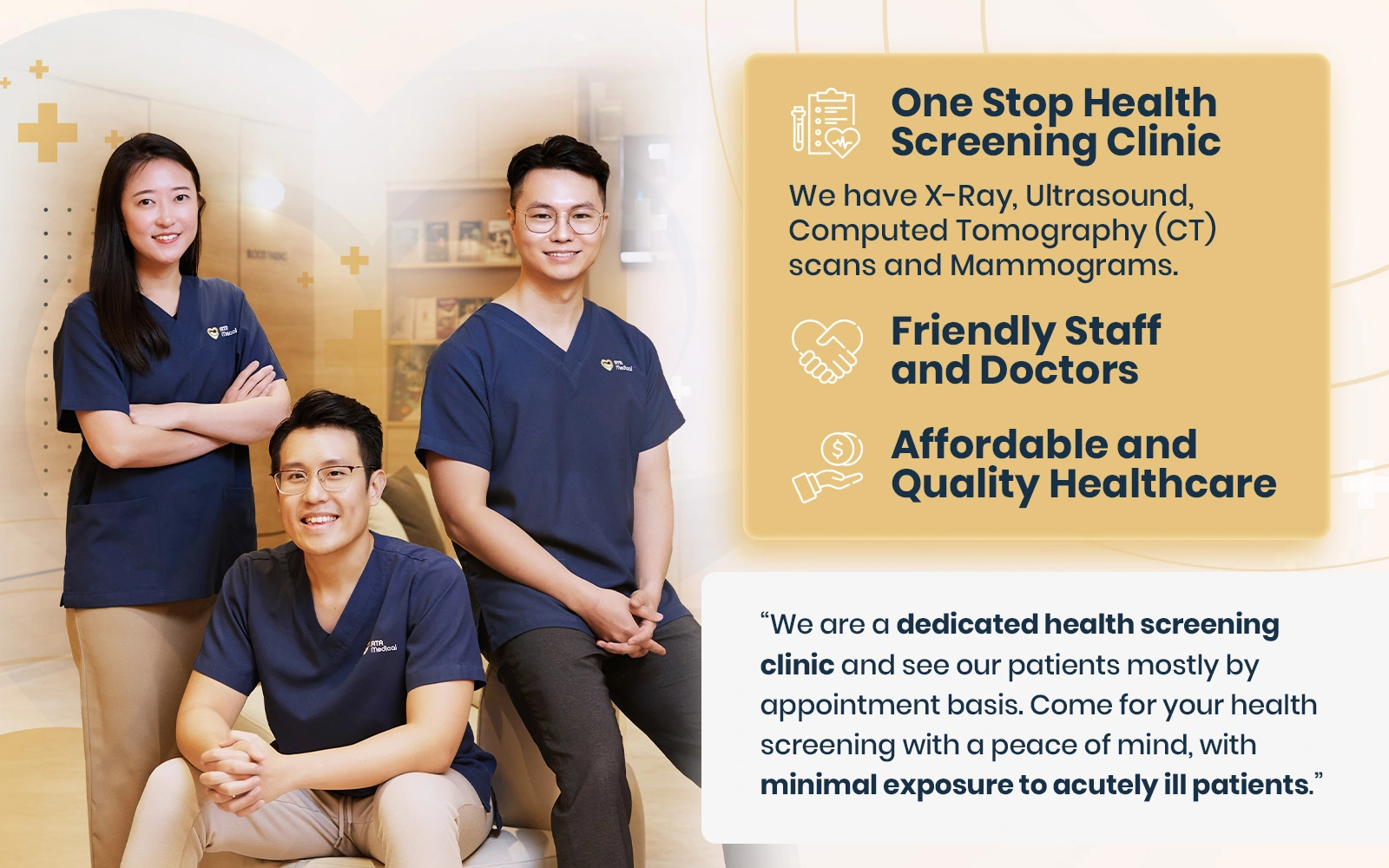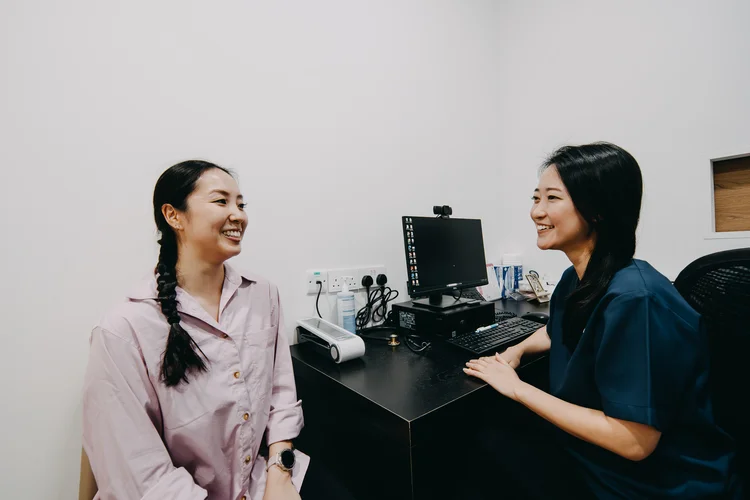Gonorrhoea Testing & Treatment
| Test Options |
|
| Treatment | Single antibiotic injection + oral antibiotics |
| Price |
|
| Appointment Options |
Same-day appointment (subject to availability). Book via WhatsApp: 8893 3757 or email: hello@healthscreening.sg |
| Clinic Locations |
Orchard: 1 Orchard Blvd
#05-09 Camden Medical Centre, S248649 Tanjong Pagar: 72 Anson Rd #01-02 Anson House, S079911 |
What Is Gonorrhoea?
Gonorrhoea is a sexually transmitted infection (STI)
that can affect individuals of any gender and may impact areas such as the throat, genitals, and rectum.
It is caused by the bacterium Neisseria gonorrhoeae.
In Singapore, gonorrhoea ranks among the top three most common STIs, according to a 2018 study.

Gonorrhoea Symptoms
Gonorrhoea symptoms can differ between men and women and may vary depending on the infection stage. Common signs include:
- A thick, cloudy, or bloody discharge from the penis or vagina
- Pain or a burning sensation while urinating
- Increased vaginal discharge or bleeding
- Swollen, painful testicles
If you have engaged in unprotected oral sex, throat symptoms such as soreness, discomfort, difficulty swallowing, or swollen lymph nodes might also develop.
How Long Do Gonorrhoea Symptoms Take to Show Up?
Symptoms generally start to develop within 1 to 14 days following exposure. In some cases, gonorrhoea may not present any symptoms at all. If you are experiencing symptoms or are uncertain, it is essential to consult a doctor.
Gonorrhoea Complications
Potential complications of untreated gonorrhoea include:
- Pelvic Inflammatory Disease (PID): An infection of the uterus and fallopian tubes in women, which can result in chronic pelvic pain, ectopic pregnancy, and infertility.
- Epididymitis: In men, this condition can cause pain and, rarely, infertility.
- Disseminated Gonococcal Infection (DGI): A severe condition that can cause joint pain, skin lesions, and even infections of the heart or brain.
- Neonatal Infections: Infants born to mothers with untreated gonorrhoea are at risk of developing conjunctivitis, which can lead to blindness if not promptly treated.
- Heightened risk of contracting other STDs: Gonorrhoea increases susceptibility to other STIs, such as herpes and hepatitis B, and raises the risk of transmitting HIV.

How to Test for Gonorrhoea?
Diagnosing gonorrhoea generally involves nucleic acid amplification tests (NAATs), which are known for their high sensitivity and specificity. These tests typically use urine samples or swabs from the infected sites.
Is Gonorrhoea Curable?
Gonorrhoea is a bacterial infection that can be successfully cured with antibiotics prescribed by a doctor. It is important to receive prompt treatment to prevent complications and risk of transmission.
Gonorrhoea Treatment
The standard treatment for gonorrhoea usually includes a combination of ceftriaxone and either azithromycin or doxycycline, which also addresses potential chlamydial co-infection.
Gonorrhoea Treatment Time
Treating gonorrhoea typically includes a single injection and a week-long course of oral antibiotics,
with symptom improvement noticed within a few days.
A follow-up test is typically performed around two weeks after completing treatment to ensure the
infection has been completely cleared, particularly if symptoms persist or there is a risk of
reinfection.
Gonorrhoea Treatment Cost in Singapore
At healthscreening.sg, we provide testing and treatment for gonorrhoea and chlamydia, with the prices as follows:
| Test/Treatment | Price* |
|---|---|
| Consultation | $49.05 |
| Chlamydia & Gonorrhoea PCR Swab | $165.68 |
| Antibiotics Injection | $32.70 |
| Doxycycline 100 mg | $15.26 (for 7 days, twice daily) |
*Prices are NETT and inclusive of GST.
^Prices last updated on
Jan 28, 2026. While every effort is made to keep pricing information up to date, please contact our team to confirm the latest rates.
How Do I Make an Appointment?
STD Test in Singapore
Regular STD screening is a crucial part of maintaining your overall health, particularly for sexually active individuals, including those with multiple partners. Early detection of sexually transmitted diseases can prevent serious health complications and ensure timely treatment. At healthscreening.sg, we offer comprehensive STD testing to help you take charge of your sexual health and safeguard your future well-being.
Why Choose Us?








Navigate Easy With Google Maps
Health Screening Singapore (Anson House)
Nearest MRT: EW15 Tanjong PagarHealth Screening Singapore (Camden Medical Centre)
Nearest MRT: TE13 Orchard BoulevardHealth Screening Singapore (CPF Jurong Building)
Nearest MRT: NS1/EW24 Jurong EastFrequently Asked Questions (FAQ)
The new guidelines recommend a single dose of ceftriaxone injection as the first-line treatment, often paired with oral doxycycline if chlamydia co-infection hasn't been excluded.
In Singapore, gonorrhoea is typically treated with a single injection of ceftriaxone, often combined with oral doxycycline or azithromycin, depending on the presence of co-infections. At healthscreening.sg, we offer testing and treatment for gonorrhoea and chlamydia if there is a co-infection.
The latest recommended treatment is a single intramuscular dose of ceftriaxone, combined with oral doxycycline if a chlamydia co-infection is suspected.
At healthscreening.sg, gonorrhoea testing is combined with chlamydia testing for $165.68 NETT, inclusive of GST. If required, we also provide treatment.
The CDC currently recommends a single dose of ceftriaxone, with an additional course of doxycycline if chlamydia has not been ruled out.
The primary treatments for gonorrhoea are a single intramuscular dose of ceftriaxone and oral doxycycline if chlamydia coinfection is a concern. At healthscreening.sg, we offer testing and treatment for gonorrhoea and chlamydia.
Doxycycline is typically prescribed as a 7-day course alongside ceftriaxone if there’s a risk of chlamydia co-infection.
In 2018, gonorrhoea was among the top three most common sexually transmitted infections in Singapore.
No, gonorrhoea treatment requires a prescription and should be administered under medical supervision.
Yes, general practitioners can diagnose and treat gonorrhoea, often with the recommended antibiotic regimen. At healthscreening.sg, we offer testing and treatment for gonorrhoea and chlamydia if there is a co-infection.
Gonorrhoea has become harder to treat due to the increasing resistance of Neisseria gonorrhoeae to many antibiotics that were previously effective.
Gonorrhoea can be permanently cured with the appropriate antibiotic treatment, but reinfection is possible if exposed again.
Gonorrhoea is typically treated within days to a week; no long-term treatment is required if promptly addressed.
After treatment, you should test negative within a few days to a week. A follow-up test is usually recommended two weeks after treatment to confirm eradication of the infection.
Treatment for gonorrhoea is typically effective when initiated promptly and appropriate antibiotics are used, though success may vary depending on factors such as antibiotic resistance.
If left untreated, gonorrhoea can lead to serious health complications, including pelvic inflammatory disease (PID), epididymitis, disseminated gonococcal infection (DGI), infertility, and an increased risk of contracting and transmitting HIV.
